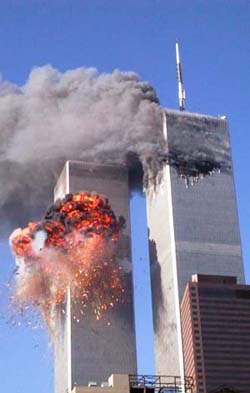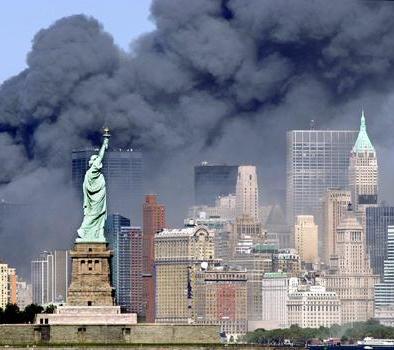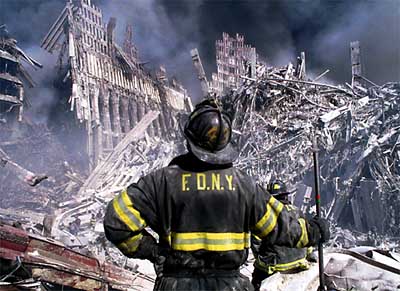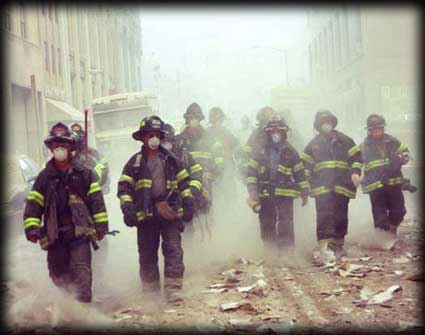Ten years later: Everyone remembers where they were on 9/11
September 11th, 2011 Posted in OpinionBy Heidi Hansen
Gruesome video footage that once seemed to play on an endless loop marks its return to cable news this week, stimulating our memories to remind us of that first day we sat transfixed and confused by a screen displaying video of the Twin Towers collapsing into smoke.
 I am taken back to the hallway outside my sixth grade classroom and my friend Jack Deaton’s frightened face as he shouted, “World War III has started!” Entering the classroom, our teacher explained that World War III had not started, but something terrible had happened.
I am taken back to the hallway outside my sixth grade classroom and my friend Jack Deaton’s frightened face as he shouted, “World War III has started!” Entering the classroom, our teacher explained that World War III had not started, but something terrible had happened.
On the 10-year anniversary of the Sept. 11, 2001, terrorist attacks, everyone remembers where they were when they heard. Most of us were at school, work or just beginning the day when the horror of what had happened reached us from the streets of New York.
The Hard News Café asked on Facebook, “Where were you and what were you doing when you learned about the Sept. 11 attacks?” Here are some of the responses:
• “I was in fourth grade. I remember walking into my elementary school and the atmosphere seemed different. The adults were somber and I would catch words of their conversations like ‘New York,’ ‘airplane crash,’ ‘terrorists . . . ,’” wrote Hannah Marie Blackburn, ASUSU PR director. “When I went home that day, I remember turning on the TV to watch my favorite afternoon PBS show, but it turned onto the news….”
• “I was walking into the TSC before a morning of classes at USU,” said former Statesman editor Jake Moon, now an executive with Method Communications in Salt Lake City. “Everyone was riveted to the TVs in the hallway and a big screen was set up in that area with all of the flags. I remember going to class, but the instructor cut it short so we could find out more about what was going on.”
 • “I was at Fort Rucker, Alabama, near the end of my training as an Apache Helicopter Pilot,” said Army Maj. Matthew T. Badell, head of USU’s Military Science Department. “A friend called and my wife and I tuned in soon enough to see the second plane hit the tower. As the class leader, I immediately got instructions and disseminated info to my classmates. The traffic jam trying to get on post later when they called us all in and the grounding of aircraft that followed seemed to halt all progress.”
• “I was at Fort Rucker, Alabama, near the end of my training as an Apache Helicopter Pilot,” said Army Maj. Matthew T. Badell, head of USU’s Military Science Department. “A friend called and my wife and I tuned in soon enough to see the second plane hit the tower. As the class leader, I immediately got instructions and disseminated info to my classmates. The traffic jam trying to get on post later when they called us all in and the grounding of aircraft that followed seemed to halt all progress.”
• Debra Jenson of Ogden, a USU master’s graduate who is completing a PhD at the University of Utah, was out of town on 9/11. “I taught a management seminar the whole day and I remember taking frequent breaks to check the news. Also, one of the fictional emails I used in my presentation referenced a meeting to be held at #1 World Trade Center and when it appeared on the screen there was an audible gasp from the room. I sat next to one co-worker at dinner after she found out she had lost a cousin at the Pentagon.”
• 9/11 By The Numbers—nearly 3,000 people who died in the 9/11 attacks.
• “I was just finishing up a graveyard shift at Tasman Roofing,” said Brad Tucker, a California school teacher, “and the morning production manager came running up to the fishbowl (office), shouting, ‘Tune in the Internet! You won’t believe what just happened!’ So, I went to Yahoo-news and 4 or 5 of us gathered around the screen. The second plane had just hit minutes before. I drove home in silence.”
The news that something impossibly horrible had happened jarred the usual morning routine nationwide, for Utahns and people across the West, the news broke before 7 a.m. It was a frightful awakening. The first plane, American Airlines Flight 11 from Boston, struck the North Tower in New York City at 8:46 a.m. (Eastern). The first TV reports aired in New York at 8:48 a.m., and CNN broke into its national reporting with the news at 8:49, or 6:49 a.m. in Utah. The second jet, United 175, flew into the South Tower 11 minutes later.
At 9:37 a.m., Eastern time, a third hijacked jet, American Flight 77, slammed into the Pentagon in Washington, D.C. Less than a half-hour later, the fourth hijacked plane, United Flight 93, crashed in a field in Pennsylvania after passengers overwhelmed the hijacker.
 • Reed Cowan, a 1997 broadcast journalism graduate, was a reporter for a Salt Lake TV station that morning. “I was the first Utah anchor to announce the attacks,” he wrote on Facebook.
• Reed Cowan, a 1997 broadcast journalism graduate, was a reporter for a Salt Lake TV station that morning. “I was the first Utah anchor to announce the attacks,” he wrote on Facebook.
• “I was lying in bed trying to wake up, listening to NPR and heard the report of the first crash and just thought it was some small plane that got off course,” said USU staff member and Herald Journal columnist Dennis Hinkamp. “Then I heard about the second and rushed downstairs to turn on the TV just in time to see the towers collapse.”
• Ted Pease and Brenda Cooper of the Department of Journalism & Communication moved from the New York area to USU in 1994. “I used to commute from New Jersey into the city by train through the terminals below the World Trade Towers,” Pease said.
“When I heard the news on NBC, all I could think about were the thousands and thousands of commuters who were passing underneath the towers when the planes hit. If the buildings had collapsed immediately, the death toll would have been much, much worse.”
• Carrie Ann Johnson, then a USU journalism/PR student, was at home. “I was feeding my two little kids breakfast when my husband called from work. We didn’t have TV at the time so I dug our little 13 inch black and white out of storage. I got it hooked up just as the first tower started to collapse,” she said.
“I held my baby and toddler close and attempted to explain what was happening. We snuggled a lot for a few days….”
• It was much the same at the Penrod house. “I was trying to wake up my kids for school and my husband was in the other room watching the news and shouting about it as usual, but this time the urgency in his voice caught my attention,” said hair stylist Emily Penrod. “I ran in to see if it was true and it was—unbelievably true. I stood there shocked watching the second tower collapse and abandoned all hope of getting my kids to school on time.”
 • Catherine Meidell, a journalism senior and current editor of The Statesman, posted on Facebook, “I remember ten years ago on this day my 6th grade teacher promised us everything would be OK. I’m not sure that was an accurate statement.”
• Catherine Meidell, a journalism senior and current editor of The Statesman, posted on Facebook, “I remember ten years ago on this day my 6th grade teacher promised us everything would be OK. I’m not sure that was an accurate statement.”
The Hard News Café also asked for thoughts on the lasting impact of the Sept. 11 terrorist attacks. Here are some of the responses:
• “Main thing that’s changed?” said Aj Chavez, a Utahn working at Maxwell Air Force Base in Alabama. “America seems to have even more of an ‘us vs them’ attitude, especially where Christians and Muslims are concerned…which is ridiculous.”
• Penrod agrees. “I was more frightened for a while, worried about something happening to my children,” she said, “but mostly I grew sad to see the hatred of Muslims simply for being Muslim.
“I wanted to distance myself from those who would hate for the sake of hate, like terrorists, and couldn’t,” she said, “because now people in ‘my group’—Americans, Christians—were full of hate, too.”
• But USU alumna Raelle Cunningham thinks people are better informed now than they were before 9/11. “Since Sept. 11, I think more people are becoming informed,” said Cunningham, a public relations graduate. “Maybe that is just me, but I feel like I spent more time watching the news and learning about what was really going on in the world.”
• 2008 journalism graduate Di Lewis, now a magazine editor in Salt Lake, said Americans became less free in some ways as a result of the attacks 10 years ago. “I don’t know that it’s possible to pinpoint one ‘main thing’ that’s changed [since Sept. 11],” she said, “but the first that comes to mind for me is how much more willing people are to accept the theater of security and major privacy and civil rights intrusions in the name of safety.”
• Michael Lyons, acting head of the USU political science department, also thinks that, in some ways, the country went overboard after 9/11.
“It was horrifying and devastating for those who perished and their families, but I believe we overacted in ways that were more destructive to us than the act itself was,” he said. “The reaction has cost millions of dollars in homeland security funding, or pork barreling… and we were frightened enough, there was enough momentum, for the Iraq War even though Saddam Hussein had nothing to do with [the attacks]—we capitalized on the fear that existed….
“Now we’re still in Afghanistan,” Lyons said, “we’ve spent trillions of dollars on the Afghanistan and Iraq wars.”
• Finally, Utah’s senior U.S. senator, Orrin Hatch, had this response to our email query: “Thank you for contacting me. I appreciate the time you took to express your views on the important issues facing our nation. It is important to me to hear your thoughts, so I can better represent you in the United States Senate. I will keep your thoughts in mind as my colleagues and I debate crucial economic, domestic, and foreign policy issues. This is an automated response. Please do not reply to this message. You will be receiving a letter from me in the near future which addresses the issues raised in your correspondence.”
TP
Tags: 10th anniversary, 9/11 attacks

Sorry, comments for this entry are closed at this time.